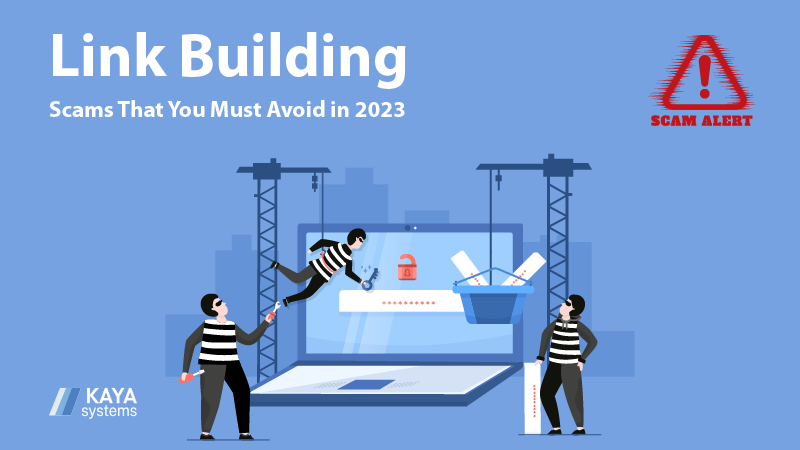
Introduction:
Link building continues to hold its significance as a fundamental strategy for enhancing a website’s search engine visibility and domain authority. However, as the practice remains crucial, it has also attracted its fair share of unscrupulous actors aiming to exploit its potential. As we navigate through 2023, it’s imperative for businesses and website owners to stay vigilant against a new wave of link-building scams that have emerged. These scams often promise quick and effortless solutions for acquiring high-quality backlinks, but instead deliver empty promises, penalties, and long-term damage to online reputations.
In this era of heightened awareness regarding online security and ethics, distinguishing between genuine link-building opportunities and deceptive schemes has become more challenging than ever. This article delves into some of the most prevalent link-building scams that individuals and organizations must be cautious of in 2023. By shedding light on these scams, we aim to empower readers with the knowledge and insights needed to safeguard their digital assets and make informed decisions when it comes to link-building strategies. As the digital landscape evolves, equipping oneself with the understanding of these scams is paramount for maintaining a trustworthy online presence and reaping the true benefits of effective link building.
What Is Link Building Scam?

A link-building scam refers to a deceptive practice in the realm of digital marketing where individuals or entities offer fraudulent or manipulative methods for acquiring backlinks to a website. These scams often promise quick improvements in search engine rankings and domain authority through illegitimate means, such as purchasing links from low-quality or irrelevant websites, participating in link farms, or using automated tools to create unnatural links. These activities violate search engine guidelines and can lead to severe penalties, including a significant drop in search rankings or even complete removal from search engine results. It’s essential to recognize and avoid link-building scams to protect the integrity of a website’s online presence and reputation.
How to Identify Link Building Scammers?

Identifying link-building scammers requires a keen understanding of the tactics they employ and a critical eye for assessing the legitimacy of their offers. Here are several key strategies to help you spot link-building scammers:
1- Unrealistic Promises: Scammers often promise extraordinary results in an implausibly short time frame. Be wary of anyone guaranteeing a massive number of high-quality backlinks overnight, as genuine link building takes time and effort.
2- Low-Quality Websites: Scammers may suggest acquiring links from irrelevant, low-quality, or spammy websites. Links from such sources not only fail to boost your SEO but can also harm your site’s reputation.
3- No Clear Strategy: Legitimate link-building professionals will outline a clear and customized strategy tailored to your website’s niche and goals. Scammers often provide vague or cookie-cutter approaches that lack specifics.
4- Unsolicited Emails: Beware of unsolicited emails offering link-building services. Many scammers use email outreach to target unsuspecting website owners with enticing offers that are often too good to be true.
5- Excessive Focus on Quantity: A focus on quantity rather than quality is a red flag. If the primary selling point revolves around the sheer number of links rather than their relevance and authority, it’s likely a scam.
6- Payment for Links: Google’s guidelines strictly discourage buying or selling links for SEO purposes. If a link-building service emphasizes payment as the primary means of acquiring links, it’s a clear indicator of a scam.
7- Lack of Transparency: Legitimate link builders are open about their methods and the websites they target. If a service is secretive about their process or the websites they intend to use, exercise caution.
8- Use of Automated Tools: Scammers might rely on automated tools to create a high volume of links quickly. Such tactics are likely to result in low-quality and unnatural links that can harm your site’s SEO.
9- Poor Communication: If the individuals behind the link-building service are evasive, unresponsive, or fail to provide clear answers to your questions, it’s a sign of their lack of credibility.
10- Check References and Reviews: Request references from previous clients or check online reviews of the service. Legitimate providers should have a track record of positive results and satisfied clients.
How to Spot Link Building Scams That Involve PBNs

Spotting link-building scams involving Private Blog Networks (PBNs) requires a vigilant approach. PBNs are often used in deceptive practices to manipulate search engine rankings. Here are key indicators to identify such scams:
- Low-Quality Domains: PBNs consist of multiple websites, and scammers often use expired or low-quality domains with minimal content and poor design. Check the websites’ overall appearance and content quality.
- Similar IP Addresses: If multiple websites within a link-building service share the same IP address, it suggests they might be part of a PBN. Tools can help identify shared IP addresses.
- Overused Themes and Templates: Scammers might reuse the same website themes or templates across multiple domains, making their network identifiable by design similarities.
- Unrelated Niches: PBNs often link to websites in unrelated niches. If the linking websites have no thematic relevance to your content, it’s likely a PBN scheme.
- Thin Content: PBN sites frequently have thin, low-quality content. Check for articles that lack depth or originality, as this is a sign of a scam.
- Unnatural Anchor Text: PBNs tend to use exact-match or keyword-rich anchor text excessively. If the anchor text looks unnatural or forced, it’s likely a PBN link.
- Unpredictable Link Placement: Legitimate backlinks usually come from relevant, high-quality content. If the placement of your link seems random or doesn’t fit naturally within the context, it’s a red flag.
- Quick and Inexpensive Offers: Scammers often promise fast and cheap access to PBN links. Authentic link-building takes time and effort, so be wary of overly convenient offers.
- Lack of Content Updates: PBNs often lack regular content updates, as maintaining a network of quality websites is time-consuming. Look for signs of outdated content.
How To Spot Inexperienced Link Builders?

- Unproven link builders may not have the required expertise and experience
- Always ask for their portfolio about the work they have done in link building
- If the link builder does not have the portfolio or any reference from a satisfied client, it could be a sign of inexperience.
- Ask for the case studies because it demonstrates the ability of a link builder to produce quality backlinks.
- Inexperienced and Unproven link builders will always make false promises and promise of fast results, but keep in mind that developing quality link building takes time.
Final Words
Most of these spammy backlinks are driven by a lack of effort and the mistaken notion that you can deceive Google. Remember, Google invests significant resources annually to counter attempts at manipulating search rankings, employing top-tier developers. So, if you intend to challenge Google, you’ll require more than just engaging in deceptive forms of link building.
So, instead of making these spammy links, try to do some smart work to produce healthy links that would not harm your business rather it will help you to grow exponentially on google and other search engines.
Tags: SEO Copywriting Agency


 Aug 04 2023
Aug 04 2023  Posted by: admin
Posted by: admin  Posted in
Posted in